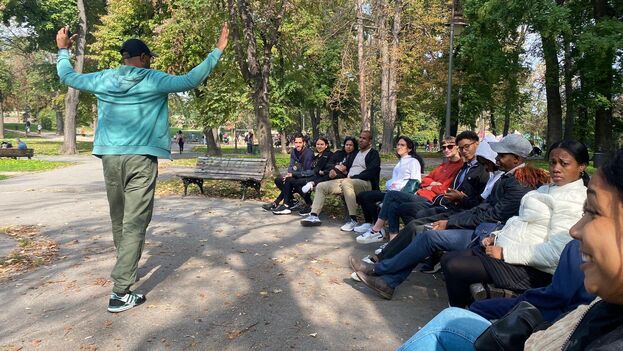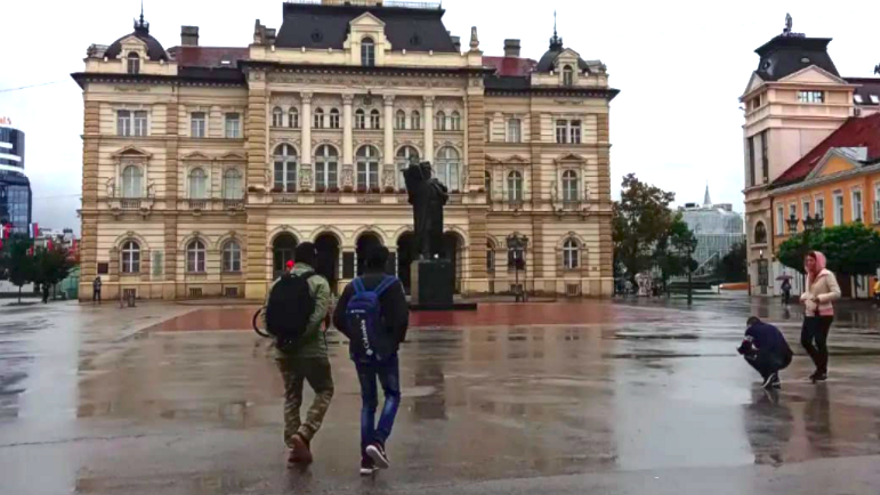
![]() 14ymedio, Havana, 15 October 2022 – – Not many Cubans could tell you where Serbia is on the map. Even fewer could say that Belgrade is the capital, or tell you anything about the many wars and divisions which determined its present shape. The memory of the Soviet era and the power of one solo leader, Marshall Tito, for too many years, seems to be the only thing the Balkan country has in common with the tropical one.
14ymedio, Havana, 15 October 2022 – – Not many Cubans could tell you where Serbia is on the map. Even fewer could say that Belgrade is the capital, or tell you anything about the many wars and divisions which determined its present shape. The memory of the Soviet era and the power of one solo leader, Marshall Tito, for too many years, seems to be the only thing the Balkan country has in common with the tropical one.
If Cubans are interested in Serbia, it is for just one reason: it is one of the few countries which don’t require a visa for people from the island and, because of its nearness — and potential entry point — to the European Union, is an ideal destination for emigration.
“I knew about Serbia from Cuban friends who had emigrated in previous years”, Diana, a young woman from Havana living in Novi Sad, a city on the shores of the Danube, tells 14ymedio.” It was a long, costly journey, but I made it”.
The Cuban and Serbian governments have ties from the times of the old Yugoslavia, so that, when Diana tells her neighbours where she comes from, more than one of them mentions Fidel Castro and talks about the island as an old “brother country”.
“My family in Cuba could not place Serbia geographically”, notes the young woman. A grandfather spoke about Yugoslavia and she was worried: the Balkans have historically been a region in conflict, with wars and corrupt governments. The territory’s fragmentation continued at least until Montenegro and Kosovo recently became independent.
“Nevertheless, I decided to take the risk”, Diana confirmed, saying she very much likes the country, which has received a flood of migrants in recent years.
Technically, Cubans have the possibility of staying in Serbia for 90 days without a visa being required, although, lately, they are being asked for a letter of invitation including the address where they are accommodated, as well as a person who “takes responsibility” for them at the airport.
As most of them don’t go back to the island, the country’s government added a requirement to show their financial solvency, and a warning that the immigration authorities have the power to refuse Cubans entry to the country” because of abuse of the visa-free policy”.
In spite of the difficulties, there is now a kind of Cuban colony in the Balkans. “The cost of living is much lower than in most European countries” says Diana. “It isn’t difficult to find work and get somewhere to live”.
Many Cuban young people now work in the service sector, in bars and restaurants, or as cleaners or construction workers. It is unusual for them to study in the universities and, if they want to get another type of work, it is essential to be able to speak Serbian.
Tastes in food and clothes are not so different to the Cuban, they are orthodox Christians and live like the rest of the Europeans. Diana comments that “Although some aspects of the culture are different, the communist past sees to it that some references and customs don’t seem so strange”.
“The climate is a surprise” she says, “although you get used to it after the first winter. In summer it goes up to 40 degrees and there are heatwaves. The strangest thing is not to be near the sea, which used to be part of my daily life”.
The Serbians are welcoming and show they are different to the “cold Europeans”. “They speak a little Spanish because they like Latin music and Mexican novels; that the television here has rebroadcast for years”.

“The laws are quite flexible for the migrants” Diana explains. “Serbia has welcomed many Syrian refugees and, with the war, also Ukrainians. Some people also come from the United States, Australia and the United Kingdom, because they prefer the legal and political flexibility here compared to their own countries”.
The Balkan nation was considered a kind of “oasis” in relation to the covid-19 pandemic restrictions. The young woman was surprised that “You didn’t have to use a mask, or get vaccinated”. This encouraged tourism.
After decades of armed conflict, Serbia opted for neutrality in its external relations, which has been brought into question by the war between Russia and Ukraine.”In spite of the recent shared cultural history with the countries of the old Soviet Union, Serbia hopes to be admitted into the European Union”, said Diana, and for that reason the best thing for the government is “not to get involved” with Putin.
“Like other Central European countries belonging to the Soviet bloc, Serbian society sees its future in alliance with the West and its way of life as a priority, rather than the Russian paradigm”, she says.
The Cubans, fed up with the politics of their own country, try to put up with the delicate status quo in Serbia and concentrate on their wellbeing. Although she is doing well in Novi Sad, Diana — who dreamt of living for a time in St.Petersburg and seeing the paintings in the Hermitage Museum — does not rule out moving to another country when the mood calms down a bit in the region.
“After all”, she says, “if nothing ties me to Cuba, right now nothing ties me to Serbia either”.
Translated by GH
____________
COLLABORATE WITH OUR WORK: The 14ymedio team is committed to practicing serious journalism that reflects Cuba’s reality in all its depth. Thank you for joining us on this long journey. We invite you to continue supporting us by becoming a member of 14ymedio now. Together we can continue transforming journalism in Cuba.
